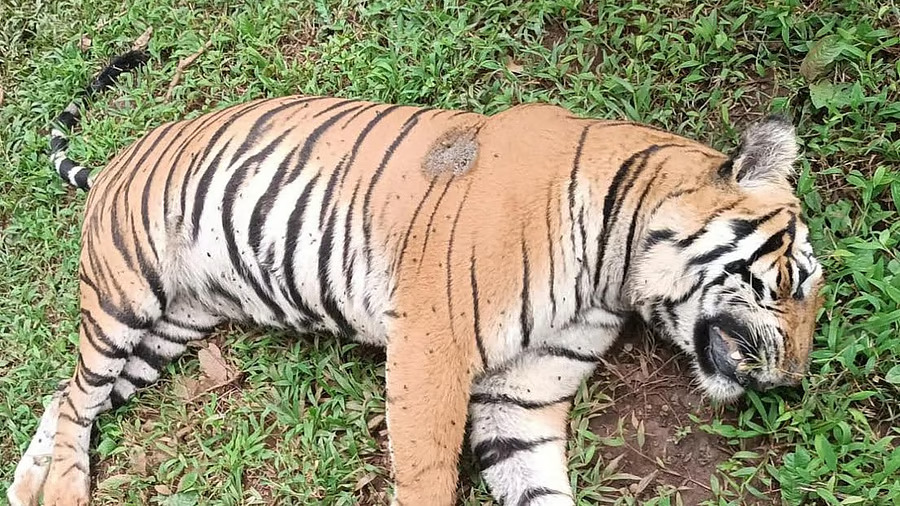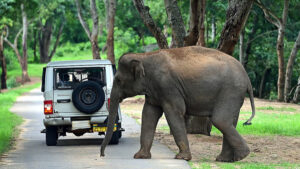A routine patrol deep within the forested expanse of Karnataka’s Bhadra Tiger Reserve led to a solemn discovery: the body of a seven-year-old tigress was found lifeless in the Lakkavalli range. Her untimely death has cast a reflective hush over conservationists, forest staff, and wildlife enthusiasts alike.
A Forest Mourns: Discovery of the Tigress
The discovery occurred during standard forest monitoring in the Saave forest beat, part of the Lakkavalli range. The patrol team found the tigress’s carcass, bearing visible injuries—signposts pointing toward a probable territorial clash with another big cat. No evidence of foul play has surfaced, and officials used a metal detector at the scene to rule out bullet wounds. A formal post-mortem was conducted, and tissue and blood samples have been dispatched to labs for definitive forensic analysis.
Protocol and Respect: The Final Farewell
Following national conservation guidelines, the tigress’s remains were cremated under controlled conditions. Witnesses included the Assistant Conservator of Forests, forest range officers, wildlife activists, veterinary professionals, and even local panchayat members—underscoring the gravity and communal respect accorded to this loss.
Why This Matters: More Than Just a Forest Loss
1. Ecology of Conflict
Territorial disputes among big cats highlight the delicate balance within wildlife habitats. Expansion in human activity, fragmentation, and shrinking corridors can force tigers into more frequent confrontations. This incident reflects the stress points within conservation zones.
2. Scientific Vigilance Needed
While initial observations point to a natural cause, forensic analyses remain critical. Understanding whether any underlying health issues, toxins, or unseen conflicts played a role is essential for wildlife management.
3. Conservation Signals
Every loss of a fully grown breeding tigress impacts the genetic strength and population dynamics of the reserve. Tigers are solitary, long-lived, and wide-ranging—making each individual’s role vital in ecosystem health.
Broader Context: Tigers in India
Earlier in the year, Karnataka saw another tragic event—the deaths of a tigress and her four cubs in a different sanctuary. Meanwhile, other regions are grappling with shifts in tiger behavior, where habituation to humans has led to fatal conflicts. These patterns illustrate the mounting pressure on conservation systems across the country.
The Way Forward: Safeguarding the Future
-
Strengthen Monitoring: Deploying more camera traps, and increasing ranger patrols in known conflict zones could preempt future clashes.
-
Protect Corridors: Securing corridors between habitats ensures tigers can roam freely without forceful encounters.
-
Engage Communities: Conservation succeeds when local communities participate—uplift them as guardians of the wilderness.
-
Deeper Scientific Insight: Detailed mortality reviews inform adaptive, responsive conservation strategies.
In Remembrance and Resolve
The silent forest now bears witness to loss—yet in remembering this tigress, we reaffirm our collective responsibility to protect the wild. May her passing inspire renewed commitment to preserving the majestic beings that shape our natural world.
Our Services – FACTS Transcripts
We at FACTS Transcripts assist in various services, including:
- Mark Sheet Transcripts
- E-Transcripts
- Duplicate Mark Sheets & Degree Certificates
- Medium of Instructions Certificates
- Attestations
- HRD Attestation / Apostille Services
- ECA (Educational Credentials Assessment)
Trusted by leading global verification organizations, including WES, IQAS, PEBC, NDEB, NASBA, CAPR, NZQA, ICAS, NCESS, ICES, ECE, eduPASS, ACEI, GCEUS, Comparative Education Services, NNAS, NCA, SAQA, QMAS, FORAC, Australian Pharmacy Council, and more.
FACTS Transcripts – The preferred choice for university document verification worldwide. We ensure a hassle-free process for obtaining your transcripts.










